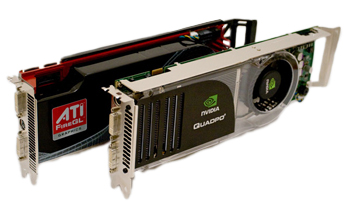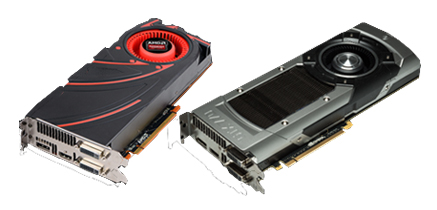The REAL Difference Between Workstation and Desktop GPUs
Published:
|
Consumer desktop-grade hardware has gotten so good these days that many people question the need for expensive workstation-grade parts in their, well, workstations. This question is understandable, since the workstation version of a particular GPU may cost four times as much when compared to the desktop card. This makes a kind of sense if you only look at the two types of cards in terms of performance. The GPU you find on a Quadro and Geforce card of the same microarchitecture generation and version are essentially the same in terms of performance figures, or at least very close. Often the desktop part will even be faster in terms of peak performance.
This is however a false comparison as the two types of card are built for very different applications and there is much more embedded in the additional cost of these professional devices than may at first be apparent to you as a consumer.  VS. VS.  In terms of hardware, workstation cards are geared more towards stability and efficiency than outright performance. A high-end desktop card aimed at gaming usually only sees a few hours at a time of maximum usage. With a workstation card a typical workload may include running at 100% for several days on end rendering 3D models, 3D animation or GPU-accelerated scientific and engineering applications. If you did this to a consumer card you would run the risk of board component failure and data errors. The supporting components such as memory and capacitors on a workstation board are a much higher grade than that found on desktop parts. The GPUs themselves are also binned for lower voltage and better stability. In other words the best individual chips are separated for use in pro-grade cards. The typical gamer does not care about (or even notice) small graphical glitches while playing, but similar deviations in pro-level applications can cause project delays and failure, costing thousands of Dollars in lost productivity. Workstation grade cards also have features that the desktop market generally does not care about. This includes things like (but are not limited to):
As you can see, just from a hardware perspective, there is already going to be a difference in these two types of cards just from the binning and feature divergence at play here. That still does not explain the huge price difference in its entirety though, to understand the rest of the story we have to talk about the relationship between professionals that use these cards, developers that write the software for these professionals and the companies that develop the cards. GPU manufacturers work closely with the people that develop software for professional applications such as Maya or 3DS Max. They work to optimize the relationship between the software and drivers so that maximum performance and stability can be achieved. This represents a big investment on the part of the GPU makers, who have to commit time and manpower to these projects. Those significant development costs must be recouped and the market for professional cards is much smaller than that of the general gaming and desktop computer market. So the already disproportionate R&D investment must now also be split amongst a much smaller group of customers. On top of this, there is usually round-the-clock support for users of these cards directly by the manufacturer. That ongoing support must also be financed. These are the unseen components of the cost difference when looking at desktop and workstation cards. We hope you now have a better understanding of the distinction between desktop and workstation cards and that you will have an easier time making a choice between the two when taking your needs into consideration. Remember that when you buy a workstation computer from TitanUS we are always on-hand to personally advise you on what hardware to buy based on your specific needs and budget, so feel free to give us a call or drop an email. |